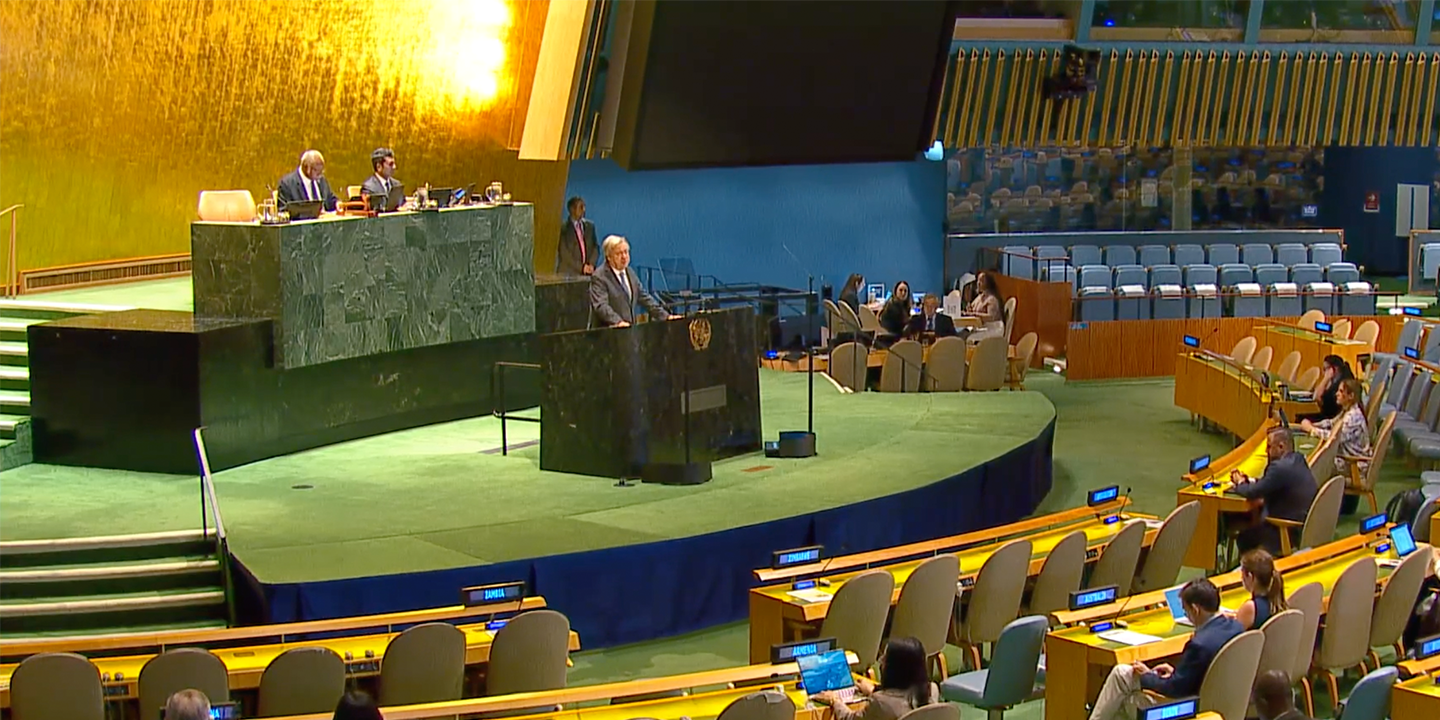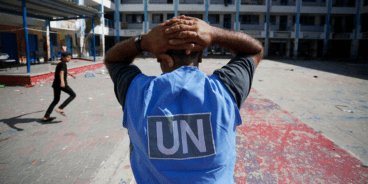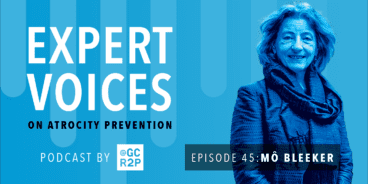

Summary of the 2025 UN General Assembly Plenary Meeting on the Responsibility to Protect
The UN General Assembly held a plenary meeting on the “Responsibility to Protect (R2P) and the prevention of genocide, war crimes, ethnic cleansing and crimes against humanity” on 25 June and 1 and 25 July as part of the formal agenda of its 79th session. This year’s debate, coinciding with the 20th anniversary of the adoption of R2P, served as a critical moment for reflection – not only on the progress made in operationalizing R2P, but also on the persistent gaps in implementation, political will and effective prevention since the 2005 World Summit. During the meeting, one regional organization (the European Union) and 58 members spoke on behalf of 99 countries and one observer mission.
BACKGROUND TO THE DEBATE
The UN General Assembly has held eight informal interactive dialogues on R2P (2010-2017) and eight debates (2009, 2018-2019 and 2021-2025). No debate or informal dialogue was held in 2020 due to the COVID-19 pandemic. Since 2009 137 states and six regional organizations or groupings have spoken in a debate or dialogue on R2P on behalf of 179 states.
Ahead of the debate the UN Secretary-General released the 17th annual report on R2P, “Responsibility to Protect: 20 years of commitment to principled and collective action,” examining the evolution of the norm over the past two decades. In doing so, the Secretary-General reflects on a troubling trend: despite the unanimous commitment to end atrocity crimes, such crimes have increased around the world, exposing a persistent gap between promises and meaningful action, particularly in the world’s gravest cases. The Secretary-General issues a stark warning, noting that continued failures to protect populations – despite our improved understanding of risk factors and enhanced capacity for response – denote a deeper, alarming challenge to mobilizing action.
PARTICIPATION OVERVIEW
The opening day of the plenary meeting was attended by the Secretary-General, the Deputy Secretary-General, the Under-Secretary-General for Policy and the Special Adviser on the Responsibility to Protect – demonstrating a clear and unequivocal commitment to the principle of R2P at the highest levels of the UN Secretariat.
H.E. Philémon Yang, President of the 79th session of the General Assembly, opened the debate with a powerful statement. While acknowledging the progress achieved over the past two decades, including the establishment of international mechanisms for atrocity prevention and the creation of judicial processes to enhance accountability for atrocity crimes, he posed a critical question: “How have we allowed ourselves to fall short?” He drew attention to the alarming developments and ongoing crises in the Middle East, including Gaza, as well as in Ukraine, Sudan and Myanmar (Burma). Marking R2P’s 20th anniversary, he called on member states to renew their commitment to the promise of “never again,” emphasizing that protection must not remain a distant aspiration, but rather a shared responsibility that requires both individual and collective action.
In his presentation of the report, the Secretary-General delivered a stark assessment of the international community’s record on atrocity prevention. He underscored that early warnings are too often ignored, while credible allegations of crimes committed by both state and non-state actors are met with “denial, indifference or repression.” Responses, when they do come, are frequently delayed, insufficient or shaped by double standards – leaving civilians to bear the heaviest burden. The Secretary-General warned that the UN’s credibility as the guardian of peace and security, development and human rights depends on its ability to act consistently and in accordance with the UN Charter.
The opening remarks were followed by interventions from Morocco, on behalf of 55 members of the Group of Friends of R2P; Venezuela on behalf of the Group of Friends in Defense of the Charter of the United Nations; Australia, on behalf of Canada and New Zealand; Demark, on behalf of Estonia, Finland, Iceland, Latvia, Lithuania, Norway and Sweden; France, on behalf of Mexico; 53 additional member states in their individual capacity and the EU.
Among the member states, several took the floor in their national capacity for the first time in years. For example, Senegal last spoke in 2010, Burundi in 2014, Sierra Leone in 2016 and Thailand in 2017. Ten states, which have participated in all previous General Assembly discussions on R2P, also took part this year: Australia, Brazil, Costa Rica, Cuba, Iran, Republic of Korea, Switzerland, United Kingdom, United States and Venezuela. In addition to Morocco’s delivery of the joint statement, twenty-seven members of the Group of Friends of R2P delivered remarks.
KEY THEMES
This year’s General Assembly debate offered a timely and valuable opportunity for member states to reflect on the state of R2P 20 years after its unanimous adoption. Beyond reaffirming support for the principle, the discussion allowed for a substantive exchange on how to strengthen atrocity prevention, address implementation gaps and adapt R2P to today’s global landscape.
Member states warned that the core promise of R2P is under threat. While many reiterated their support for paragraphs 138 and 139 of the World Summit Outcome Document, they also condemned the rising civilian harm, growing impunity and a blatant disregard of the international norms designed to safeguard human life. Nevertheless, several states underscored that R2P continues to offer the strongest normative foundation for protecting populations from mass atrocities. In this context, Uruguay stated, “we are convinced that paragraphs 138 and 139 constitute the most effective framework within which the international community can act to tackle threats of war crimes, genocide, ethnic cleansing and crimes against humanity.” Poland acknowledged that “R2P seems now more relevant than ever, as a beacon of hope for those to whom war has brought suffering and misery.”
States also reflected on the progress made over the past 20 years in strengthening the international community’s ability to prevent and respond to atrocities. By emphasizing that key UN bodies, including the Security Council (UNSC) and the General Assembly, have referenced R2P in more than 215 resolutions, Costa Rica asserts that the principle is “no longer a merely theoretical concept. It has become a guiding principle of the modern international order.” Many highlighted the development of early warning mechanisms and the increased understanding of risk factors of atrocity crimes – such as identity-based discrimination, patterns of human rights violations, hate speech and the weakening of state institutions – as well as the importance of tracking specific indicators that may signal an imminent risk of atrocity crimes. Several states also emphasized the importance of building national, regional and international capacities and capabilities to respond effectively and in a timely manner when warning signs emerge. Additionally, 10 states (on behalf of 60 and the EU) acknowledged the importance of the Global Network of R2P Focal Points – which recently held its 11th meeting – in enhancing international cooperation and coordination, as well as supporting the institutionalization of atrocity prevention efforts at the national level.
The debate also served as a sober reckoning as states underscored that the legitimacy of R2P rests not only on its moral and political weight, but on its consistent implementation – and that failure to act in the face of atrocities undermines both the credibility of the principle and the institutions that uphold it. Ghana pointed out, “we must acknowledge that R2P faces a crisis of confidence, not of its ideals, but of its implementation. For R2P to remain a vital framework for prevention, protection and accountability, the failings we have seen should be addressed by a reinvigoration of political will and a commitment not to look away when the truth is inconvenient.” Djibouti emphasized, “the ‘Never Again’ promise remained obstinately promissory and … continues to be an aspiration that has yet to be honored and fulfilled.”
In this context, the varying responses of the international community to crises in places like Gaza, Sudan, Myanmar or elsewhere were repeatedly highlighted as emblematic of double standards or selective engagement, eroding trust in the principle and raising questions about the political will to uphold R2P across all contexts. Venezuela, on behalf of the Group of Friends in Defense of the Charter of the UN, stated, “if we are truly committed to “never again,” we must start, among others, by ending the politicization of the appalling human suffering in Palestine, which continues to stand as a grim testament to the double standards that afflict the international community’s approach to human rights and protection.” To overcome these challenges, Ghana emphasized, “together we must shake ourselves from the slumber of collective inertia and rise to our common responsibility to act when required and to protect those who need it.”
Throughout the debate, states reiterated the three key priorities outlined by the Secretary-General for improving responses to atrocity risks: strengthening permanent national prevention mechanisms; fostering the exchange of experiences and closer collaboration between national and regional actors; and developing strategic and technical guidance to implement the responsibility to protect across domestic, regional and multilateral levels. In this context, recognizing the power of national and regional prevention mechanisms and reflecting upon its own experiences, Sierra Leone called on the international community to “expand and operationalize regional early warning networks and the capacity to share data, expertise and rapid deployment resources across borders.”
The Responsibility to Protect and Atrocity Prevention as a UN Priority
The Secretary-General reaffirmed the central role of atrocity prevention within the UN’s work, stressing the need “to mainstream atrocity prevention across the United Nations system – from humanitarian action to peacekeeping to human rights.” He further called for “integrating early warning, supporting national prevention mechanisms, and embedding atrocity prevention in the broader agendas of sustaining peace, human rights and the 2030 Agenda.” The Group of Friends of R2P recognized that significant progress has been made across the UN to “build early warning and prevention capacities, including through peacekeeping reforms, the creation of the UN peacebuilding architecture and expanded mediation and diplomacy efforts that increasingly incorporate an atrocity prevention lens.”
The Office of the UN Special Advisers on the Prevention of Genocide and the Responsibility to Protect (OSAPG) remains a crucial pillar in advancing these efforts. During the debate, 23 speakers (on behalf of 66 member states and the EU) expressed support for the OSAPG. Malta stated that the expertise and guidance of the Special Advisers are “essential in helping member states and the UN system detect and respond to atrocity risks before it is too late.” Several states, including Germany, encouraged the OSAPG to “issue timely and consistent statements on country-specific situations and to provide thematic briefings and in-depth analyses at relevant fora.” They further urged the Special Advisers to “systematically share early warning assessments and atrocity prevention recommendations with the broader UN membership, including the Security Council, General Assembly, and Human Rights Council.”
As the UN currently navigates far-reaching institutional reform and growing financial constraints, there is an urgent need to safeguard its ability to prevent conflict, respond to crises and protect vulnerable populations from atrocity crimes. In this context, Bulgaria underscored that, as part of the ongoing discussions around the UN80 initiative and implementation of the Pact for the Future, the international community “must join efforts to strengthen the prevention and the peacebuilding activities of this Organization.” The Group of Friends of R2P reaffirmed the UN’s founding purpose, as outlined in the Charter, to “save succeeding generations from the scourge of war” and “reaffirm faith in fundamental human rights, in the dignity and worth of the human person.” They further emphasized that the UN80 process must “preserve critical UN functions underpinning peace and security, development and human rights, required to address root causes of conflict and humanitarian need, and strengthen the UN’s capacity to prevent atrocity crimes.” Poland also recognized that, given the multifaceted nature of prevention and protection, “a strong UN institutional mandate, effective cooperation within the UN and continued collaboration with member states, regional bodies and civil society organizations” is required.
The Role of the UN Security Council
Concerns over the UNSC’s ability to respond to atrocity crimes featured prominently in the debate. Several delegations emphasized that the UNSC bears a unique responsibility to respond swiftly and decisively to situations where populations are at risk of genocide, war crimes, ethnic cleansing and crimes against humanity. They also underscored that when the UNSC fails to act – due to paralysis, selective engagement or the misuse of the veto power – the credibility of the entire international system is questioned or undermined. As such, many states reiterated calls for more consistent and principled action by the UNSC.
Türkiye stressed that “preserving the UN’s credibility and relevance requires urgent reform of the Council,” adding that “the veto remains one of the most pressing issues to address.” Slovenia, speaking as a current member of the Council, voiced its strong belief that the veto “should not be used in situations where there is a clear threat of mass atrocity crimes, as it hinders effective decision-making and prevents action that would help to protect populations in a timely and effective manner.” Sierra Leone, also a current UNSC member, echoed this position and supported calls for Council reform and a more responsible use of the veto in response to atrocity risks. France, also speaking on behalf of Mexico, reinforced this message by stating that “the veto is not a privilege but a responsibility,” and that the Council “should never be paralyzed in the face of such tragic situations.” In the same spirit, Nigeria urged the UNSC to “act with unity and resolve when signs of mass atrocities emerge” and to “ensure that geopolitical considerations do not hinder timely and decisive action to protect vulnerable populations.”
Fifteen states and the EU mentioned various initiatives aimed at guiding the voting behavior of UNSC members, including the ACT Code of Conduct and the French-Mexican initiative on the use of veto in the case of mass atrocities.
Justice and Accountability for Atrocity Crimes
Justice and accountability for atrocity crimes once again stood out as a central theme in this year’s debate, underscoring the enduring conviction among many member states that accountability is indispensable to both prevention and long-term peace. Ninety-two states and the EU emphasized the need to ensure justice for victims of mass atrocity crimes. Numerous states emphasized that victims have a right to justice and that addressing impunity is essential to rebuilding trust and restoring the social fabric torn apart by mass violence.
Thirty-three states and the EU reiterated their support for a range of international mechanisms as vital tools in ensuring perpetrators are held to account. As the International Criminal Court (ICC) faces unprecedented political attacks and threats, 28 states and the EU used this year’s debate to reaffirm their unwavering support for the Court and its independence and mandate. They emphasized that safeguarding the integrity of the ICC is essential to the global fight against impunity and the broader effort to ensure justice for victims of atrocity crimes.
Several states referred to ongoing cases at international courts, including in the context of the situations in Gaza/Israel and Myanmar. Others welcomed recent efforts to advance international legal cooperation and close accountability gaps. In this regard, Slovenia highlighted the relevance of the Ljubljana-The Hague Convention on International Cooperation in the Investigation and Prosecution of the most serious international crimes.
There was also renewed momentum behind efforts to codify an international treaty on the prevention and punishment of crimes against humanity. A number of states referred to the resolution adopted by consensus by the Sixth Committee of the General Assembly in November 2024, which paved the way for formal treaty negotiations based on the International Law Commission’s draft articles. In welcoming this development and the potential of a dedicated international treaty, the Netherlands emphasized that “the current international context once again illustrates the need to fill the gap in the international legal framework.”
Cross-cutting Issues
Many states linked R2P and atrocity prevention to UN agendas related to development and the Sustainable Development Goals, the Women, Peace and Security agenda, peacekeeping, peacebuilding and climate security. States also referred to the New Agenda for Peace and the Pact for the Future.
Fourteen states on behalf of 60 and the EU underlined the importance of integrating R2P and atrocity prevention in peacebuilding efforts. Nigeria stated, “the convergence of R2P’s 20th anniversary and the UN Peacebuilding Architecture Review in 2025 presents a strategic opportunity to revitalize global commitment to atrocity prevention and the protection of populations. These include embedding the norm within prevention tools, financing structures and regional partnerships, with a view to turning early warning into early action.”
Several speakers also highlighted the continuing need to confront incitement to violence, hate speech and propaganda campaigns that target specific groups, as well as social and religious marginalization, which, when combined with other root causes and risk factors, can create an environment conducive to the commission of atrocity crimes. This year, growing concern was expressed over the expanding use of artificial intelligence and unregulated emerging technologies, with warnings that, without proper safeguards, these tools can obscure accountability, lower the threshold for the use of force and amplify the scale of atrocity crimes.
This year also saw an increase in the number of country situations raised, reflecting growing concern over the mounting scale and worsening global trends of atrocity crimes. In describing the suffering of vulnerable populations in Gaza, Myanmar and northern Nigeria, Timor-Leste stated that, “the principle of protection rings hollow when the international community remains paralyzed, shackled by geopolitical rivalries, the misuse of vetoes and a crisis of collective will. The 20th anniversary of R2P must not be a ceremonial pause; it must be a moment of reckoning, and a moment to recommit to bold political action.” It is for this reason that Djibouti shared a clear message: “the time to implement R2P is now, and it should not be wasted, unlike many golden opportunities in the past that have been squandered.”
CONCLUSION
The General Assembly plenary meeting brought together a wide range of perspectives on the achievements and challenges of implementing R2P since its adoption and the need to mobilize collective action to prevent mass atrocities. Member states engaged in a constructive dialogue and exchanged views on both persistent obstacles and possible avenues for more effective action.
This year’s debate highlighted a renewed commitment among many member states to close the implementation gap and strengthen atrocity prevention efforts. There was broad recognition that reaffirming support for R2P is not enough. This commitment must be matched by practical measures to strengthen early warning, support and invest in national, regional and international prevention capacities and ensure timely and decisive action when populations are at risk.
In light of the growing number of conflicts, atrocities and other alarming trends, Sierra Leone powerfully concluded that this “demands renewed resolve and not only ceremonial remembrance.” Looking ahead, this momentum – coupled with broader UN reforms – offers a critical opportunity to advance more timely, coordinated and consistent responses to the risk of atrocity crimes, and to protect all populations wherever they are threatened.
Related Content


UN80 and the Future of Atrocity Prevention: Opportunities for Structural Reform
